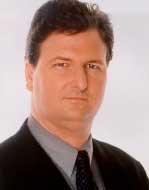Creating a Great Life Is as Easy as 1-2-3
|
2.27.03 - Alex Lightman, Calit² scholar and author of the book Brave New Unwired World, addressed an audience of UCSD graduate and undergraduate students on February 20 in a talk co-sponsored by Calit² and Sixth College. Drawing from his personal experience as an entrepreneur, columnist, and speaker, Lightman provided practical ideas to get the audience thinking about following their dreams, creating enjoyable lives -- and getting paid to do so.
The first step is having a personal vision, an area of individual expertise that you can identify as your purpose. Lightman pointed out that it is generally only the first person to reach a significant goal that is remembered, so it pays to be a pioneer. (Can you recall the name of the second person to fly non-stop across the Atlantic?)
But how to identify this core idea? According to Lightman, one can often see where a trend is leading (e.g., faster and more ubiquitous wireless communication) and imagine what the world will be like in the future. The missing link is the description of the steps that will lead from the present to the imagined future. This detailed description establishes the expertise of the specialist and, if the vision is compelling and the reasons supporting it are convincing, can improve the likelihood of the imagined outcome because people start to identify with and believe in the core vision.
The emphasis of Lightman's talk was on pragmatic approaches. How does one establish a reputation and gain credibility? How can one stand out from the torrent of media imagery and sound bites? Lightman offered several ideas on improving professional visibility, concentrating on those that are within your "span of control," meaning actions you can take without needing someone else's permission.
In this regard, Lightman is clearly a proponent of the "fortune favors the brave" philosophy. Thinking about getting a patent? Don't concentrate on why it didn't work out for someone else or how hard it is to do. Instead, do it, learn about it, and improve your understanding of a new area. Once you've traveled that path, you have something to write and talk about, and chances are you've opened up a new area to explore.
Before finishing his talk with a few book recommendations, Lightman spoke about some of his own personal experiences and offered some creative ideas for getting recognition and creating "pull" demand for your own expertise (as opposed to "pushing" your resume on the work world).
If I had to summarize the talk in one sentence it would be this: When your kids look you up on Google, make sure it's an interesting read.
This article was contributed to the Calit² Web site by Peter Fryscak, an NYU M.S. in Computer Science and a specialist in hi-tech finance and venture capital.


